Bangladesh: Controversial history, extremism keeps Jamaat away
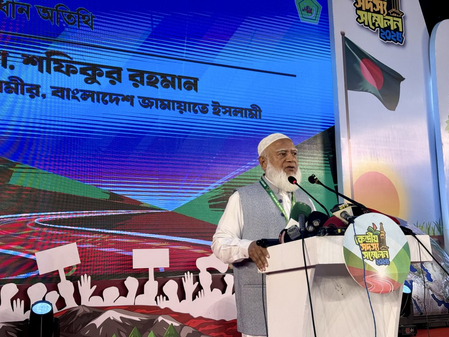
Dhaka, Feb 14 (IANS) Despite emerging as the second-largest political force in the recently concluded Bangladesh's 13th Parliamentary election, Jamaat-e-Islami failed to convert its numerical presence into meaningful political success. The paradox extends beyond contemporary electoral dynamics rooted in the party's historical choices, ideological rigidity, and its controversial role during some of the “most traumatic chapters” of South Asian Muslim history, a report said on Saturday.
According to a report in International Business Times (IBT), understanding why Jamaat-e-Islami continues to struggle for legitimacy in Bangladesh requires revisiting its origins, political conduct, and the enduring shadow of violence and division that shape public memory.
The report stressed that following partition, Jamaat-e-Islami’s founder, Maulana Maududi, relocated to Pakistan with his full political machinery to implement its ideological agenda and, over the years, resorted to armed struggle in the country to enforce its interpretation of Islam.
“Jamaat-e-Islami Pakistan is a violent organisation with a long history of extremism. Its student wing, Islami Jamiat-e-Talaba, once turned Pakistan's colleges, universities, and other educational institutions into centres of conspiracy, hooliganism, and bloodshed. Booth capturing in student elections, kidnapping rival candidates, murder, and violent intimidation in the name of enforcing their version of Islam became their defining achievements. Panjab University Lahore, Bahauddin Zakariya University Multan, Sindh University, Karachi University, and many other higher educational institutions were, at one time, terrifying hubs of their violence,” a report detailed.
“When the Bengali Muslim population of East Pakistan (present-day Bangladesh), frustrated by the unwise policies, political arrogance, and Punjabi chauvinism of West Pakistan's politicians, bureaucrats, and military, launched a movement for freedom from oppression, various actors exploited the chaos for their own interests. In those turbulent circumstances, Jamaat-e-Islami in Bangladesh should have stood with Bengali Muslims against the injustices of West Pakistan. Instead, it sided with the Pakistani army and became complicit in the killing of Bengali Muslims,” it added.
Moreover, the report said, the political ideology promoted by Jamaat-e-Islami and the version of Islam it seeks to impose cannot take root in South Asia, and the party cannot succeed with fundamental transformation at the grassroots level.
The report further noted, “the world is well aware of how Jamaat-e-Islami Pakistan has been based on its policies, and Bengali Muslims also clearly remember the past role played by Jamaat-e-Islami in Bangladesh.”
--IANS
scor/as
Women deserve Parliament seats on merit, not party patronage: Bangladesh Media
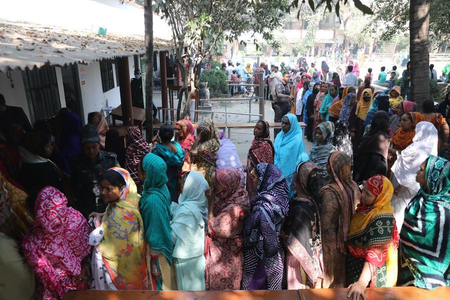
New Delhi, Feb 14 (IANS) In Bangladesh, several rights groups and media reports have highlighted the dearth of women candidates in the general election, despite the founding fathers and current leaders having pledged to make politics equally accessible to men and women.
In the run-up to the 13th national election, too, reports had flagged “systemic design and failure” as the main reasons. This year, a total of 51 political parties took part in Thursday’s election, where there are 1,981 candidates in the fray. Among them were only 86 women candidates, of whom seven won – six from the victorious Bangladesh Nationalist Party (BNP), and one independent.
“Political parties chose to nominate fewer women this time (in polls), as has been the trend earlier. Women's rights activists had hoped that the rate of women's nominations would increase in the wake of the July movement,” reported Bangladesh’s widely circulated newspaper ‘Prothom Alo’ on Saturday.
“However, despite strong objections from women's rights activists, political parties agreed to nominate 5 per cent of their total candidates in their talks with the Jatiya Oikyamoto Commission (National Consensus Commission). However, the parties did not fulfil that promise,” it added.
According to reports, the Commission was formed in early February last year to review and adopt the recommendations submitted by the six key reform commissions set up by the Muhammad Yunus-led interim government.
Meanwhile, in order to let more women join the lawmaking process, Bangladesh had introduced reserved seats for women in parliament, which The Daily Star had earlier termed “an affirmative action strategy employed globally to rectify historical injustices and dismantle structural barriers. However, the objective of such measures is not permanence; rather, it is to build a society where women can compete and succeed on an equal footing with men.”
The June-end report last year stressed women entering parliament not with party patronage, but through public preference and political merit.
“We began with 15 reserved seats in 1972. Today, there are 50. On paper, this expansion signals progress. In practice, however, the structure and process of filling these seats – originally intended to amplify women's voices – have become politically ornamental, elite-driven, and disconnected from public legitimacy. Instead of electing women based on public preference and political merit, the system centralises power in the hands of party leadership,” it analysed.
Tracing the history of women’s nomination, the Prothom Alo report quoted a research report by the Election Commission and Khan Foundation titled ‘Empowering Women Through Reserved Seats in Parliament: Fight or Flight Response?’, and newsletters of Democracy International, as well as the newspaper’s own reports.
“In the first national parliament (1973-1975), women representation was only in the then 15 reserved seats. In the second (1979-1982), there were a total of 32 women members of parliament, including 2 elected and 30 reserved seats. In the fourth parliament (1988-1990), there were no reserved seats, and there were 4 elected representatives. In the fifth, (1991-1995), there were 35 women members of parliament, including 5 elected representatives,” it recounted.
In the February 1996 general election, which the report termed as “BNP's one-sided” exercise, “3 women were directly elected. There were 30 reserved seats,” it added.
The Khaleda Zia-led BNP government did not last long, and a snap poll was held in June when eight women were directly elected, bringing their total representation to 38.
In the subsequent polls, the number of reserved seats was increased to 45, while seven women in the eighth, and 21 in the ninth national election were elected.
“Thereafter, the number of reserved women seats was increased to 50. The total number of women members of parliament became 70. During the Awami League's tenure, the elections of 2014, 2018, and 2024 were one-sided and contentious. In these three elections, 18, 23, and 19 women were elected, respectively,” the report said.
--IANS
jb/uk
Bangladesh: Fact-checking organisation debunks claims of Jamaat’s ‘deep state’ narrative
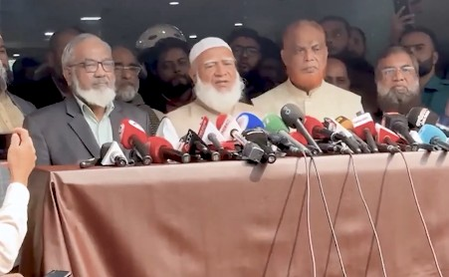
Dhaka, Feb 14 (IANS) Bangladesh’s fact-checking organisation Dismislab, through data analysis, has debunked a coordinated social media campaign alleging that “deep state” manipulation cost radical Islamist party Jamaat-e-Islami and its allies dozens of seats through “election engineering”, a report said on Saturday.
It added that the narratives, which surfaced on February 13 – the day after the vote – claimed that Jamaat candidates lost in 53 different constituencies by margins of fewer than 5,000 votes.
According to a report in the 'Times of Bangladesh', a viral post questioned why Jamaat’s Ameer Shafiqur Rahman accepted the results, alleging that “deep state” manipulation reduced the party’s projected 135 seats to 70-80.
Citing an analysis by Dismislab based on seat-wise results published by Bangladesh’s leading newspaper, Prothom Alo, it reveals these figures to be inaccurate, with data showing that only 22 seats across the country were decided by margins of fewer than 5,000 votes, not the claimed 53 seats.
The analysis suggests that narrow victory margins applied to both major alliances rather than favouring any one side.
“Jamaat or allied candidates won the country’s two closest races: Madaripur-1 (385-vote margin) and Sirajganj-4 (594-vote margin). Conversely, BNP-supported candidates secured narrow victories in Cox’s Bazar-4, Chattogram-14, and Brahmanbaria-5, with margins of 929, 1,026, and 1,061 votes respectively. Further examination of the 50 closest races, where margins ranged from 385 to 9,581 votes, showed that Jamaat and its allies won 24 seats, while the BNP and its allies won 22,” the report detailed.
Despite the absence of supporting evidence, the report said, these claims were widely amplified across social media platforms through individual posts and coordinated campaigns.
“Identical text questioning why the Ameer accepted ‘election engineering’ appeared under reports by the media outlet Amar Desh and on the ‘Jobians’ Facebook page, a forum for Jagannath University students. One user even claimed that in 57 seats, the margin between Jamaat and BNP candidates was only 70 to 5,000 votes,” it mentioned.
“A verified page named “Tanvir Sir” falsely claimed that a coalition with the Pir of Charmonai using the ‘hand-fan’ symbol could have secured an additional 40–50 seats. Additionally, a well-known parody profile named ‘journalist Moniruzzaman’ used an image of the Jamaat Ameer becoming ill on stage to suggest that the party, with its alleged margins, would have controlled more than 200 upazilas,” it noted.
The report highlighted that following a review of at least a dozen such posts and comments, Dismislab concluded that the “narratives were designed to suggest Jamaat would have won significantly more seats without a ‘deep state’ conspiracy”.
--IANS
scor/as
Rubio: US-China dialogue is an obligation
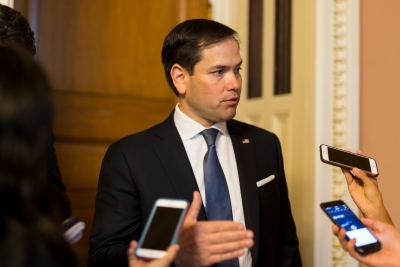
Washington, Feb 14 (IANS) US Secretary of State Marco Rubio on Saturday said Washington has an “obligation to communicate” with China, describing sustained dialogue between the world’s two largest economies as a strategic necessity even amid deep structural tensions.
Speaking at the Munich Security Conference, Rubio said: “The two largest economies in the world, two of the big powers on the planet, we have an obligation to communicate with them and talk.” He added, “I mean, it would be geopolitical malpractice to not be in conversations with China.”
His remarks came in response to a question about an expected summit “in about two months’ time” between President Donald Trump and Chinese President Xi Jinping.
Rubio acknowledged that rivalry between Washington and Beijing is likely to persist. “Because we’re two large countries with huge global interests, our national interests will often not align,” he said. “Their national interests and ours will not align, and we owe it to the world to try to manage those as best we can, obviously avoiding conflict, both economic and worse.”
He said engagement does not imply concessions. “Nothing that we agree to could come at the expense of our national interest,” Rubio stressed, adding that the United States expects China “to act in their national interest, as we expect every nation-state to act in their national interest.”
Rubio also noted that tensions in trade and technology have broader implications. “Whatever happens between the U.S. and China on trade has a global implication,” he said.
At the same time, he left room for cooperation where possible. “On areas in which our interests are aligned, I think we can work together to make positive impact on the world, and we seek opportunities to do that with them.”
But he cautioned that differences are enduring. “There are long-term challenges that we face that we’re going to have to confront that are going to be irritants in our relationship with China,” he said. “No one is under any illusions. There are some fundamental challenges between our countries and between the West and China that will continue for the foreseeable future for a variety of reasons.”
In his broader address, Rubio urged Western nations to rebuild industrial capacity, secure “critical minerals not vulnerable to extortion from other powers,” and invest in emerging sectors such as “cutting-edge artificial intelligence.”
The Munich Security Conference, founded in 1963, has long served as a forum for transatlantic and global strategic debates. In recent years, discussions have increasingly centered on managing strategic competition with China, particularly over trade, technology, supply chains, and influence in the Indo-Pacific.
US-China ties have been marked by trade disputes, export controls on advanced technologies, tensions over Taiwan, and competing geopolitical interests. Even so, successive administrations have maintained high-level diplomatic channels to manage risks and prevent escalation between the two powers.
--IANS
lkj/as
We are part of one civilization – Western civilization: US Secy of State Marco Rubio in Munich
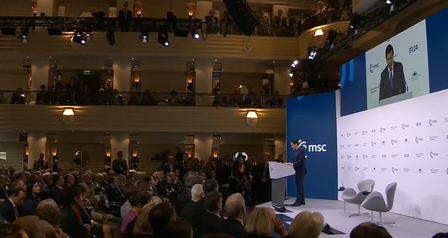
Washington, Feb 14 (IANS) US Secretary of State Marco Rubio used his first major address at the Munich Security Conference on Saturday to call for what he described as a renewed transatlantic mission — one rooted in “seriousness and reciprocity” and focused on reindustrialization, border control, and emerging technologies such as “cutting-edge artificial intelligence.”
“We gather here today as members of a historic alliance, an alliance that saved and changed the world,” Rubio said in Munich, invoking the Cold War origins of the conference and the “line between communism and freedom” that once ran through Germany.
Rubio argued that the post-Cold War period produced “a dangerous delusion” — including the belief in “the end of history,” that “trade and by commerce alone would now replace nationhood,” and that a “rules-based global order” would “replace the national interest.” He called that “a foolish idea” and said it had “cost us dearly,” pointing to deindustrialization and weakened supply chains across the West.
“We made these mistakes together, and now, together, we owe it to our people to face those facts and to move forward, to rebuild,” Rubio said.
He framed the Trump administration’s approach as national renewal, telling European allies that while Washington is “prepared, if necessary, to do this alone,” it “hope[s] to do this together with you, our friends here in Europe.” Rubio described the US-Europe relationship as civilizational, saying, “We are part of one civilization – Western civilization.”
Rubio said national security is “not merely series of technical questions,” but begins with “what exactly are we defending,” adding: “Armies fight for a people; armies fight for a nation. Armies fight for a way of life.”
He said “mass migration” is “a crisis which is transforming and destabilising societies all across the West,” and argued, “We must also gain control of our national borders. Controlling who and how many people enter our countries, this is not an expression of xenophobia,” he said.
Rubio urged a broader agenda beyond defence spending — “commercial space travel and cutting-edge artificial intelligence,” “industrial automation,” “a Western supply chain for critical minerals,” and “a unified effort to compete for market share in the economies of the Global South.”
In a brief Q&A, Rubio said the prospects for ending the war in Ukraine remain uncertain. “We don’t know the Russians are serious about ending the war; they say they are,” he said, adding that the hardest questions remain unresolved and “work remains to be done.”
He said, “The United States has imposed additional sanctions on Russia’s oil,” and added: “In our conversations with India, we’ve gotten their commitment to stop buying additional Russian oil.”
Asked about China ahead of a summit expected “in about two months’ time” between President Trump and President Xi Jinping, Rubio said it would be “geopolitical malpractice to not be in conversations with China,” but warned that “nothing that we agree to could come at the expense of our national interest.”
The Munich Security Conference is an annual gathering of global leaders, diplomats, and defence officials that has long served as a key forum for transatlantic security debates, including NATO burden-sharing and major global conflicts.
--IANS
lkj/as
Bangladesh: BNP’s Tarique Rahman calls for maintaining law and order ‘at any cost’
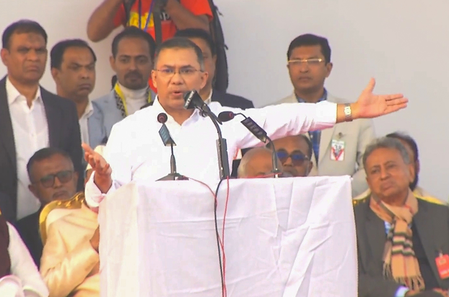
Dhaka, Feb 14 (IANS) With the Bangladesh Nationalist Party (BNP) set to form the next government in Bangladesh following a decisive victory in the 13th Parliamentary election, the party’s chairman, Tarique Rahman on Saturday emphasised the need to maintain law and order “at any cost” and urged everyone to cooperate in building a safe and humane nation, the local media reported.
Rahman, who is set to become the next Prime Minister of Bangladesh after his party secured an absolute majority in the election, made the remarks while addressing a press briefing on Saturday afternoon in Dhaka.
“We need everyone’s cooperation to build a safe and humane Bangladesh. This time, everyone must play a responsible role in rebuilding the country. No injustice can be done to anyone on any excuse. Law and order must be maintained at any cost,” Bangladesh’s leading newspaper Dhaka Tribune, quoted Rahman as saying.
Stressing the need to maintain law and order, Rahman warned that any acts of violence, retaliation, or provocation would not be tolerated.
He further said, "My stance is clear; peace and order must be maintained at any cost. No form of injustice or illegal activities will be tolerated. Irrespective of party affiliation, religion, colour, or differing opinions — no justification will be accepted for the strong attacking the weak."
The BNP chairman described the election outcome as “the victory of the people,” saying the freedom-loving people of the country had made BNP victorious.
BNP won 209 out of 297 seats in the February 12 election, with its candidates leading in the two constituencies including Chattogram-2 and 4 where results have been withheld. Their allies have claimed three seats.
On the other hand, Jamaat-e-Islami has won 68 seats, while the partners in the Jamaat-led 11-party electoral alliance secured nine seats. Islami Andolan Bangladesh (IAB) claimed one seat, and independent candidates won in seven constituencies, Prothom Alo reported.
With Tarique Rahman now set to lead Bangladesh - the country last saw a male PM almost 35 years ago - experts warn that the nation faces a massive challenge of overcoming the unrest and rising Islamist extremism that marked the 18-month tenure of the Muhammad Yunus-led interim government.
--IANS
scor/as
Global inaction enables Pakistan’s proxy warfare against neighbours: Report

Islamabad, Feb 14 (IANS) India must continue exposing Rawalpindi’s nexus with terrorist groups and its tendency to pursue proxy war against neighbouring countries as Pakistan has long evaded accountability due to global apathy.
At the same time, India also needs to bolster its counter-terrorism apparatus to effectively confront the menace of Pakistan-sponsored terrorism single-handedly and, in addition to military retribution, adopt “non-kinetic measures that impose a prohibitive cost on Islamabad”, a report said on Saturday.
Writing for Eurasia Review, former army officer Nilesh Kunwar said, “While its designation may sound impressive, the UN Analytical Support and Sanctions Monitoring Team of the Security Council’s 1267 Sanctions Committee is unfortunately just a ‘paper tiger’ that bases its reports on feedback from member states without investigating the same or giving any directions.
"Its recently released 37th report has linked Pakistan-based proscribed terrorist group Jaish-e-Mohammad [JeM] to the April 22, 2025, Pahalgam attack, the November 9, 2025, Red Fort suicide car bombing, as well as its formal announcement of a women-only wing named Jamaat-ul-Muminat created for waging global jihad. However, by qualifying that these incidents/developments were what 'a member State [implying India] had noted', the UN report has characteristically not endorsed its own observations on the same,” he added.
The report noted that although the UN Analytical Support and Sanctions Monitoring Team lacks "teeth" and doesn’t act as an effective deterrent, its report offers diplomatic leverage.
“In the instant case, India definitely has an advantage since, unlike Islamabad’s palpably false claim of JeM being ‘defunct,’ is a feeble defence - New Delhi’s assertions on JeM’s activities are corroborated by irrefutable hard evidence,” it stressed.
According to the report, the Indian aerial strike on the terror group JeM headquarters at Pakistan’s Bahawalpur on May 7 last year, during Operation Sindoor, which led to its destruction, triggered widespread protests among several senior JeM leaders.
“Isn’t this, along with the JeM chief’s own admission that he had lost 10 family members in this attack, ample proof that despite being a UN proscribed terrorist group, JeM is not only alive and kicking but continues to flourish in Pakistan even today?” the report questioned.
“In November last year, the discovery of a ‘white collar’ terror module operating from Al Falah University in Faridabad near India’s capital comprising mostly doctors has provided indisputable evidence of JeM’s continuing efforts to orchestrate terrorist activities in India, and the suicide car bomb blast near New Delhi’s Red Fort on November 10 last year by a member of this module is proof of JeM’s sinister designs,” Kunwar stated.
--IANS
scor/as
‘Dark Prince’ of Bangladesh Tarique Rahman faces a long and difficult road ahead
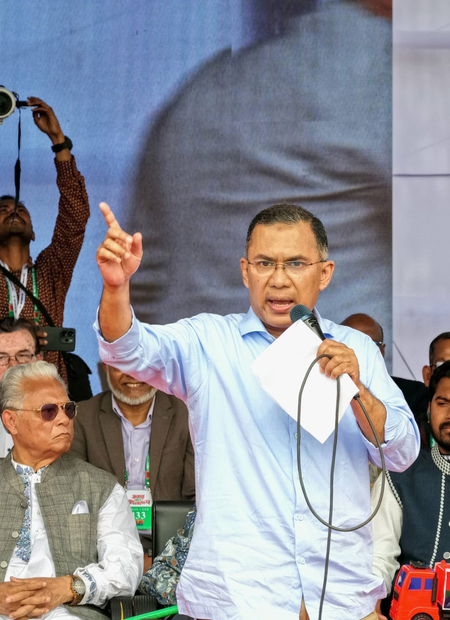
New Delhi, Feb 14 (IANS) With the recent poll verdict overwhelmingly favouring the Bangladesh Nationalist Party (BNP), and its Chairman Tarique Rahman all set to assume the office of Prime Minister, there is much interest in him as a person and politician.
Much of it has arisen due to his long absence from home, and earlier in Bangladesh, being largely involved in backroom operations.
Several video clips circulating on social media have caught him in different moods. In one, he is found telling followers not to hail him repeatedly since he does not like it. In another, he is chiding supporters for raising slogans, calling them “newcomers”, and advising them to seek the guidance of “older” BNP workers.
On another occasion, his purported carcade comes to a halt at a traffic signal, where the commentary stated that he refused to zip past despite the policeman on duty asking him to go ahead.
There is much curiosity around the eldest son of former President Ziaur Rahman and former Prime Minister Khaleda Zia. Rahman rose through party ranks in the 1990s and early 2000s, becoming a powerful behind-the-scenes operator.
After legal cases and political pressure at home, he spent roughly 17 years in exile in London, though continuing to direct party strategy and maintain influence over BNP cadres.
The 60-year-old leader’s return to frontline politics in December followed a dramatic electoral comeback for the party.
Called the “dark prince” largely due to his preference to be in the shadows, Rahman faced multiple criminal charges and convictions in Bangladesh, which his supporters describe as politically motivated and his critics cite as evidence of corruption and abuse of power.
These legal battles shaped his years in exile and remain a politically sensitive element of his public profile.
While some portray him as a decisive leader who can restore unity and revive the party, opponents label him a dynastic figure whose return risks renewed polarisation. Once he assumes office, immediate challenges will include political consolidation, diplomatic recalibration, economic stabilisation, managing fundamentalist pressure, and restoring law and order and institutional trust.
The new government needs to convert electoral victory into effective political authority while avoiding polarising moves that could provoke unrest.
Early priorities include appointing a capable cabinet, stabilising party structures after years of exile or factionalism, and signalling a commitment to inclusive governance to calm public anxieties.
Rebuilding pragmatic ties with India is an urgent diplomatic task. New Delhi has signalled readiness to engage, but it will watch Dhaka’s posture on sensitive issues such as the status of political figures in exile and further outreach to Pakistan.
At the same time, Dhaka will need to manage the pressures from Pakistan and China to redraw diplomatic links following the Muhammad Yusun-led interim government’s public overtures towards Islamabad and Beijing.
Additionally, it is yet to be seen how China reacts in future to the interim government’s trade deal with the United States.
The country’s garment and textile sector, which underpins exports and employment, faces disruption and rising competition. It is expected to find some relief with the deal.
But inflation and unemployment have eroded public patience, making economic recovery a political imperative. The health sector remains under pressure, more so after the withdrawal of USAID.
Meanwhile, the election verdict may have been against Islamist parties dominating policy, but pressure from conservative religious groups remains, especially in terms of gender and religious equality.
Another issue is the law-and-order situation since the 2024 unrest, leading to attacks on Awami League workers and the lynching of Hindus.
The incident has had a demoralising effect on the country’s police force too. The dark prince, now in the spotlight, has a long and difficult path to tread.
--IANS
jb/skp
Silencing guns remains challenge in Africa: AUC chief
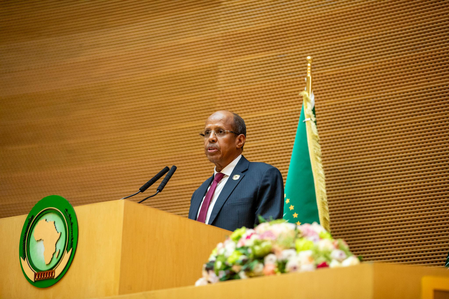
Addis Ababa, Feb 14 (IANS) Chairperson of the African Union Commission (AUC) Mahmoud Ali Youssouf on Saturday expressed concern over Africa's inability to address peace and security perils across different parts of the continent.
The AUC chief made the remarks during the opening session of the 39th Ordinary Session of the Assembly of Heads of State and Government of the AU, which runs on Saturday and Sunday at the AU headquarters in Addis Ababa, the capital of Ethiopia.
"Our summit is taking place in a geopolitical context of crisis, both on the continent and throughout the world. Silencing the Guns on our continent remains a challenge," Youssouf told African leaders.
Acknowledging the political and institutional fragility of several African countries as a source of continental concern, he said "open and latent conflicts are becoming chronic."
"Unconstitutional changes of government are resurfacing, reminding us of the dark days following independence," he said, Xinhua news agency reported. Highlighting the situation in Sudan, eastern Democratic Republic of the Congo, and Somalia, among others, Youssouf said "our peoples continue to pay a heavy price for instability."
Meanwhile, the chairperson of the 55-member continental organisation noted that the recent "upheaval in the international order is certainly having a significant impact on the affairs of the continent."
Noting that multilateralism is being "severely tested with the rise of unilateralism and protectionism," he said Africa needs to strengthen its continental unity to withstand external shocks.
"Major political and economic blocs are preparing for this global polarization. Africa is certainly part of the Global South, but Africa has its own distinctive character and identity," he said.
"Faced with this situation, Africa must strengthen itself by accelerating its political and economic integration programs. Pan-African institutions must redouble their efforts and determination. Agenda 2063 and its flagship programs must guide us toward the Africa we envision -- strong, autonomous, and prosperous," Youssouf said.
The two-day summit, which brings together leaders from AU members, was launched under the AU's 2026 theme: 'Assuring Sustainable Water Availability and Safe Sanitation Systems to Achieve the Goals of Agenda 2063'.
Prime Minister of Ethiopia Abiy Ahmed, for his part, underscored the need to harness Africa's demographic dividend as a vital imperative for holistic development.
"Today, many African economies are among the fastest-growing in the world," Abiy said. "Yet growth alone is not enough. Our greatest wealth is our people. By 2035, Africa will add more young people to the global workforce than the rest of the world combined. This demographic reality must be harnessed with purpose. Numbers alone will not deliver prosperity."
The opening session drew African heads of state and government, alongside leaders of continental and international organizations, including UN Secretary-General Antonio Guterres.
--IANS
/as
Voters in Bangladesh close doors on Islamist Jamaat, re-entry of pro-Pakistan political nostalgia
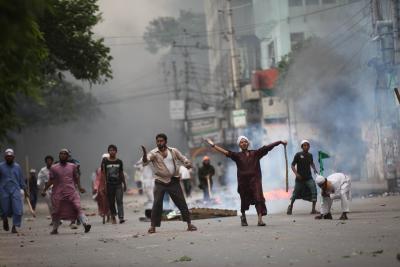
Dhaka, Feb 14 (IANS) Voters in Bangladesh this week chose equilibrium over extremism, democracy over doctrinaire politics, and sovereignty over subtle subservience with the results reflecting their silent revolt against extremism and pro-Pakistan politics, a report has highlighted.
"History has a way of returning, though rarely in the same uniform. Bangladesh's 2026 election was not merely a transfer of power; it was a verdict on identity. When voters handed the Bangladesh Nationalist Party (BNP) a landslide —nearly two-thirds of Parliament — they were not just ending 15 years of Awami League dominance. They were closing the door on something else: the quiet re-entry of pro-Pakistan political nostalgia into our public life," political and defence analyst M A Hossain wrote in the weekly Blitz.
The BNP-led alliance claimed a decisive victory in the Bangladesh elections on Friday, securing 210 seats and comfortably surpassing the majority threshold, thus paving the way for the formation of a new government.
Now, the test for BNP, reckoned Hossain, is to engage all without submitting to any.
"The electorate has drawn a boundary: no more experiments with ideological radicalism; no more opaque deals conducted in the name of expediency. Voters demanded transparency in governance and clarity in foreign policy. They demanded that Bangladesh be neither a pawn nor a proxy," he wrote.
The electorate, the analyst wrote, saw through Islamist Jamaat-e-Islami party's narrow worldview — one that "conflated religious affinity' with strategic wisdom.
"Young Bangladeshis are digitally fluent, globally aware, and impatient with ideological theatrics. They have watched the Middle East’s experiments with political Islam, Europe’s battles with extremism, and South Asia’s oscillations between strongman rule and democratic revival. Their message was not radical; it was refreshingly moderate. They chose liberal democracy over radical romanticism," opined Hossain in weekly Blitz magazine.
The opinion piece highlighted that the 51-point manifesto of Tarique Rahman-led BNP reads less like a revolutionary tract and more like a technocratic repair manual.
"Bangladesh has experienced what might be called a democratic reset. The ouster of Sheikh Hasina in 2024 created uncertainty; the 2026 election restored procedural legitimacy. BNP’s commanding majority ensures constitutional reform without dependence on Islamist blocs. Jamaat, with its 63 seats, remains a vocal opposition — but not a kingmaker," it stated.
"That arithmetic matters. It prevents the ideological overreach many feared. It assures regional partners that Dhaka’s compass will not swing unpredictably toward Islamabad or any other capital," Hossain added.
--IANS
/as
